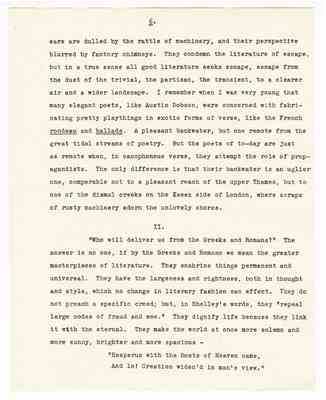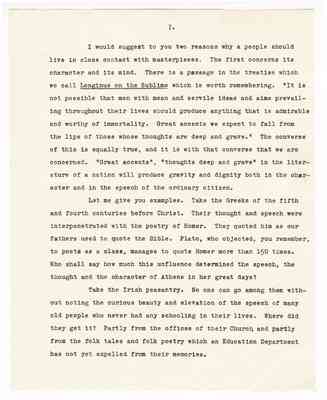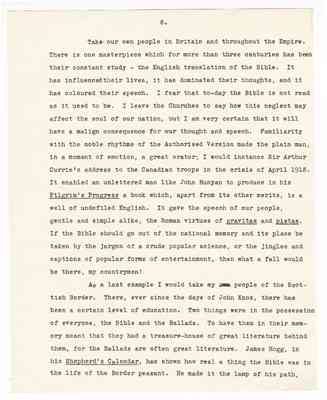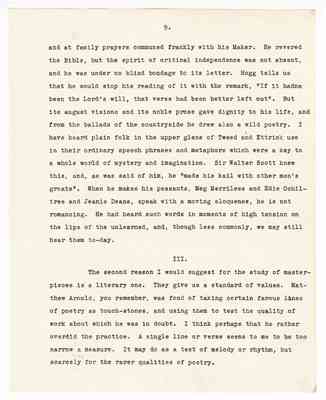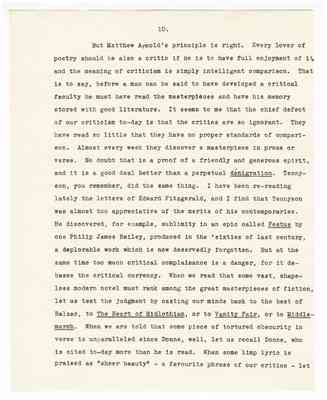Pages
page_0006
6.
ears are dulled by the rattle of machinery, and their perspective blurred by factory chimneys. They condemn the literature of escape, but in a true sense all good literature seeks escape, escape from the dust of the trivial, the partisan, the transient, to a clearer air and a wider landscape. I remember when I was very young that many elegant poets, like Austin Dobson, were concerned with fabricating pretty playthings in exotic forms of verse, like the French rondeau and ballade. A pleasant backwater, but one remote from the great tidal streams of poetry. But the poets of today are just as remote when, in cacophonous verse, they attempt the role of propagandists. The only difference is that their backwater is an uglier one, comparable not to a pleasant reach of the upper Thames, but to one of the dismal creeks on the Essex side of London, where scraps of rusty machinery adorn the unlovely shores.
II.
"Who will deliver us from the Greeks and Romans?" The answer is no one, if by the Greeks and Romans we mean the greater masterpieces of literature. They enshrine things permanent and universal. They have the largeness and rightness, both in thought and style, which no change in literary fashion can effect. They do not preach a specific creed; but, in Shelley's words, they "repeal large codes of fraud and woe." They dignify life because they link it wtth the eternal. They make the world at once more solemn and more sunny, brighter and more spacious
"Hesperus with the hosts of Heaven came, And lo! Creation widen'd in man's view."
page_0007
7.
I would suggest to you two reasons why a people should live in close contact with masterpieces. The first concerns its character and its mind. There is a passage in the treatise which we call Longinus on the Sublime which is worth remembering. "It is not possible that men with mean and servile ideas and aims prevailing throughout their lives should produce anything that is admirable and worthy of immortality. Great accents we expect to fall from the lips of those whose thoughts are deep and grave." The converse of this is equally true, and it is with that converse that we are concerned. "Great accents", "thoughts deep and grave" in the literature of a nation will produce gravity and dignity both in the character and in the speech of the ordinary citizen.
Let me give you examples. Take the Greeks of the fifth and fourth centuries before Christ. Their thought and speech were interpenetrated with the poetry of Homer. They quoted him as our fathers used to quote the Bible. Plato, who objected, you remember, to poets as a class, manages to quote Homer more than 150 times. Who shall say how much this unfluence determined the speech, the thought and the character of Athens in her great days?
Take the Irish peasantry. No one can go among them without noting the curious beauty and elevation of the speech of many old people who never had any schooling in their lives. Where did they get it? Partly from the offices of their Church and partly from the folk tales and folk poetry which an Education Department has not yet expelled from their memories.
page_0008
8.
Take our own people in Britain and throughout the Empire. There is one masterpiece which for more than three centuries has been their constant study - the English translation of the Bible. It has influenced their lives, it has dominated their thoughts, and it has coloured their speech. I fear that to-day the Bible is not read as it used to be. I leave the Churches to say how this neglect may affect the soul of our nation, but I am very certain that it will have a malign consequence for our thought and speech. Familiarity with the noble rhythms of the Authorised Version made the plain man, in a moment of emotion, a great orator; I would instance Sir Arthur Currie's address to the Canadian troops in the crisis of April 1918. It enabled an unlettered man like John Bunyan to produce in his Pilgrim's Progress a book which, apart from its other merits, is a well of undefiled English. It gave the speech of our people, gentle and simple alike, the Roman virtues of gravitas and pietas. If the Bible should go out of the national memory and its place be taken by the jargon of a crude popular science, or the jingles and captions of popular forms of entertainment, then what a fall would be there, my countrymen!
As a last example I would take my people of the Scottish Border. There, ever since the days of John Knox, there has been a certain level of education. Two things were in the possession of everyone, the Bible and the Ballads. To have them in their memory meant that they had a treasure-house of great literature behind them, for the Ballads are often great literature. James Hogg, in his Shepherd's Calendar, has shown how real a thing the Bible was in the life of the Border peasant. He made it the lamp of his path,
page_0009
9.
and at family prayers communed frankly with his Maker. He revered the Bible, but the spirit of critical independence was not absent, and he was under no blind bondage to its letter. Hogg tells us that he would stop his reading of it with the remark, "If it hadna been the Lord's will, that verse had been better left out". But its august visions and its noble prose gave dignity to his life, and from the ballads of the countryside he drew also a wild poetry. I have heard plain folk in the upper glens of Tweed and Ettrick use in their ordinary speech phrases and metaphors which were a key to a whole world of mystery and imagination. Sir Walter Scott knew this, and, as was said of him, he "made his kail with other men's groats". When he makes his peasants, Meg Merrilees and Edie Ochiltree and Jeanie Deans, speak with a moving eloquence, he is not romancing. He had heard such words in moments of high tension on the lips of the unlearned, and, though less commonly, we may still hear them to-day.
III.
The second reason I would suggest for the study of masterpieces is a literary one. They give us a standard of values. Matthew Arnold, you remember, was fond of taking certain famous lines of poetry as touchstones, and using them to test the quality of work about which he was in doubt. I think perhaps that he rather overdid the practice. A single line or verse seems to me to be too narrow a measure. It may do as a test of melody or rhythm, but scarcely for the rarer qualities of poetry.
page_0010
10.
But Matthew Arnold's principle is right. Every lover of poetry should be also a critic if he is to have full enjoyment of and the meaning of criticism is simply intelligent comparison. That is to say, before a man can be said to have developed a critical faculty he must have read the masterpieces and have his memory stored with good literature. It seems to me that the chief defect of our criticism today is that the critics are so ignorant. They have read so little that they have no proper standards of comparison. Almost every week they discover a masterpiece in prose or verse. No doubt that is a proof of a friendly and generous spirit, and it is a good deal better than a perpetual denigration. Tennyson, you remember, did the same thing. I have been re-reading lately the letters of Edward Fitzgerald, and I find that Tennyson was almost too appreciative of the merits of his contemporaries. He discovered, for example, sublimity in an epic called Festus by one Philip James Bailey, produced in the 'sixties of last century, a deplorable work which is now deservedly forgotten. But at the same time too much critical complaisance is a danger, for it debases the critical currency. When we read that some vast, shapeless modern novel must rank among the great masterpieces of fiction, let us test the judgment by casting our minds back to the best of Balzac, to The Heart of Midlothian, or to Vanity Fair, or to Middlemarch. When we are told that some piece of tortured obscurity in verse is unparalleled since Donne, well·, let us recall Donne, who is cited today more than he is read. When some limp lyric is praised as "sheer beauty" - a favourite phrase of our critics - let
